Regional Gardens Data Integrity Policy Report Analysis
VerifiedAdded on 2022/08/23
|10
|2264
|17
Report
AI Summary
This report presents a comprehensive data integrity policy designed for Regional Gardens, addressing the company's need for enhanced data security and management. The policy's purpose is to mitigate risks associated with outdated systems and protect valuable data assets, including servers, databases, and customer information. The report details the policy's scope, impacting the entire organization and its stakeholders, and outlines the roles and responsibilities of key personnel, including systems administrators and employees. Mandatory requirements such as documentation, automated systems, anti-virus applications, and periodic data reviews are emphasized. The policy also identifies exemptions, such as research and development laboratories, and suggests including insurance plans, data portability legislations, and automation in design services. The report concludes with a glossary of terms and references, providing a complete overview of the data integrity policy and its implementation within Regional Gardens.
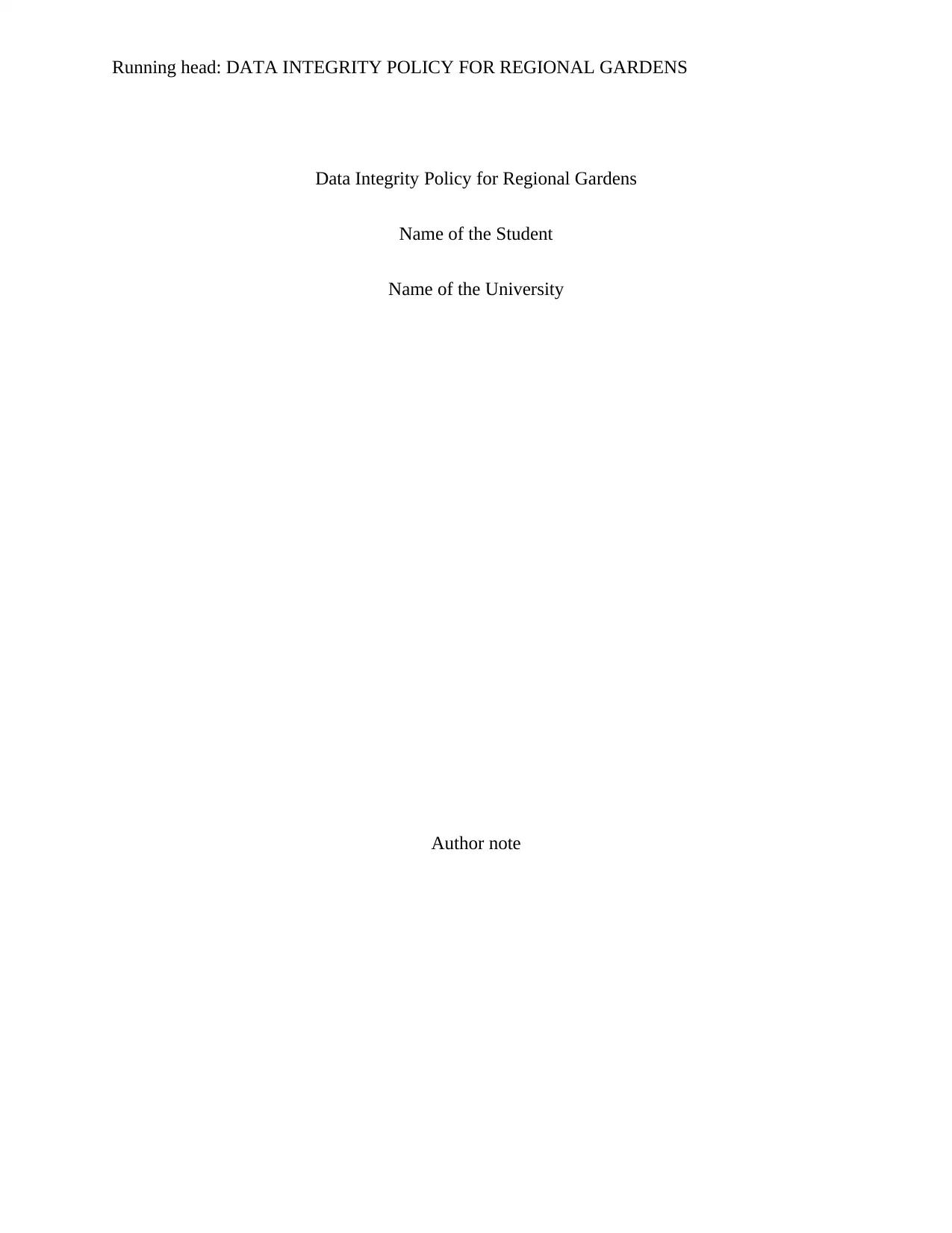
Running head: DATA INTEGRITY POLICY FOR REGIONAL GARDENS
Data Integrity Policy for Regional Gardens
Name of the Student
Name of the University
Author note
Data Integrity Policy for Regional Gardens
Name of the Student
Name of the University
Author note
Paraphrase This Document
Need a fresh take? Get an instant paraphrase of this document with our AI Paraphraser
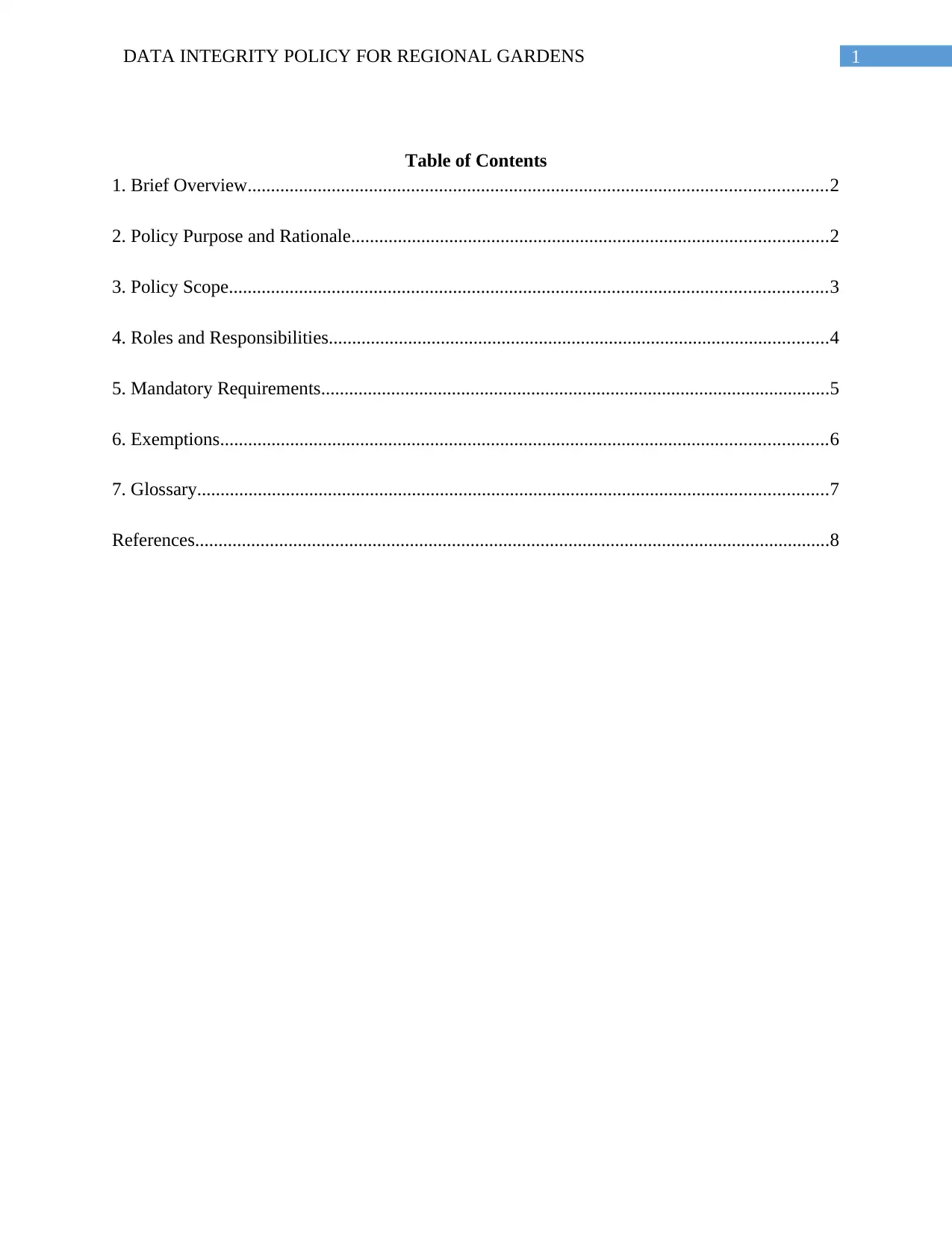
1DATA INTEGRITY POLICY FOR REGIONAL GARDENS
Table of Contents
1. Brief Overview............................................................................................................................2
2. Policy Purpose and Rationale......................................................................................................2
3. Policy Scope................................................................................................................................3
4. Roles and Responsibilities...........................................................................................................4
5. Mandatory Requirements.............................................................................................................5
6. Exemptions..................................................................................................................................6
7. Glossary.......................................................................................................................................7
References........................................................................................................................................8
Table of Contents
1. Brief Overview............................................................................................................................2
2. Policy Purpose and Rationale......................................................................................................2
3. Policy Scope................................................................................................................................3
4. Roles and Responsibilities...........................................................................................................4
5. Mandatory Requirements.............................................................................................................5
6. Exemptions..................................................................................................................................6
7. Glossary.......................................................................................................................................7
References........................................................................................................................................8
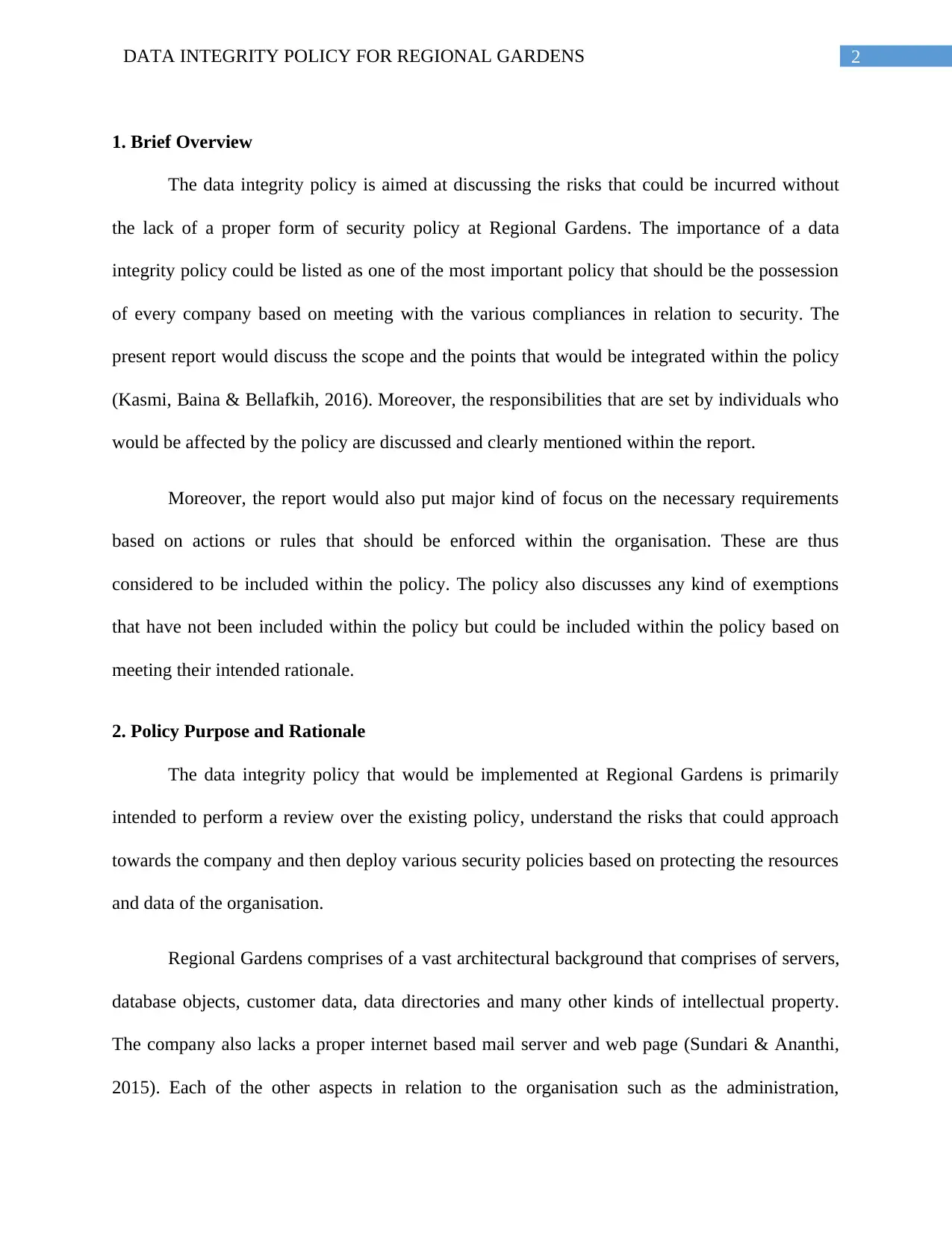
2DATA INTEGRITY POLICY FOR REGIONAL GARDENS
1. Brief Overview
The data integrity policy is aimed at discussing the risks that could be incurred without
the lack of a proper form of security policy at Regional Gardens. The importance of a data
integrity policy could be listed as one of the most important policy that should be the possession
of every company based on meeting with the various compliances in relation to security. The
present report would discuss the scope and the points that would be integrated within the policy
(Kasmi, Baina & Bellafkih, 2016). Moreover, the responsibilities that are set by individuals who
would be affected by the policy are discussed and clearly mentioned within the report.
Moreover, the report would also put major kind of focus on the necessary requirements
based on actions or rules that should be enforced within the organisation. These are thus
considered to be included within the policy. The policy also discusses any kind of exemptions
that have not been included within the policy but could be included within the policy based on
meeting their intended rationale.
2. Policy Purpose and Rationale
The data integrity policy that would be implemented at Regional Gardens is primarily
intended to perform a review over the existing policy, understand the risks that could approach
towards the company and then deploy various security policies based on protecting the resources
and data of the organisation.
Regional Gardens comprises of a vast architectural background that comprises of servers,
database objects, customer data, data directories and many other kinds of intellectual property.
The company also lacks a proper internet based mail server and web page (Sundari & Ananthi,
2015). Each of the other aspects in relation to the organisation such as the administration,
1. Brief Overview
The data integrity policy is aimed at discussing the risks that could be incurred without
the lack of a proper form of security policy at Regional Gardens. The importance of a data
integrity policy could be listed as one of the most important policy that should be the possession
of every company based on meeting with the various compliances in relation to security. The
present report would discuss the scope and the points that would be integrated within the policy
(Kasmi, Baina & Bellafkih, 2016). Moreover, the responsibilities that are set by individuals who
would be affected by the policy are discussed and clearly mentioned within the report.
Moreover, the report would also put major kind of focus on the necessary requirements
based on actions or rules that should be enforced within the organisation. These are thus
considered to be included within the policy. The policy also discusses any kind of exemptions
that have not been included within the policy but could be included within the policy based on
meeting their intended rationale.
2. Policy Purpose and Rationale
The data integrity policy that would be implemented at Regional Gardens is primarily
intended to perform a review over the existing policy, understand the risks that could approach
towards the company and then deploy various security policies based on protecting the resources
and data of the organisation.
Regional Gardens comprises of a vast architectural background that comprises of servers,
database objects, customer data, data directories and many other kinds of intellectual property.
The company also lacks a proper internet based mail server and web page (Sundari & Ananthi,
2015). Each of the other aspects in relation to the organisation such as the administration,
⊘ This is a preview!⊘
Do you want full access?
Subscribe today to unlock all pages.

Trusted by 1+ million students worldwide
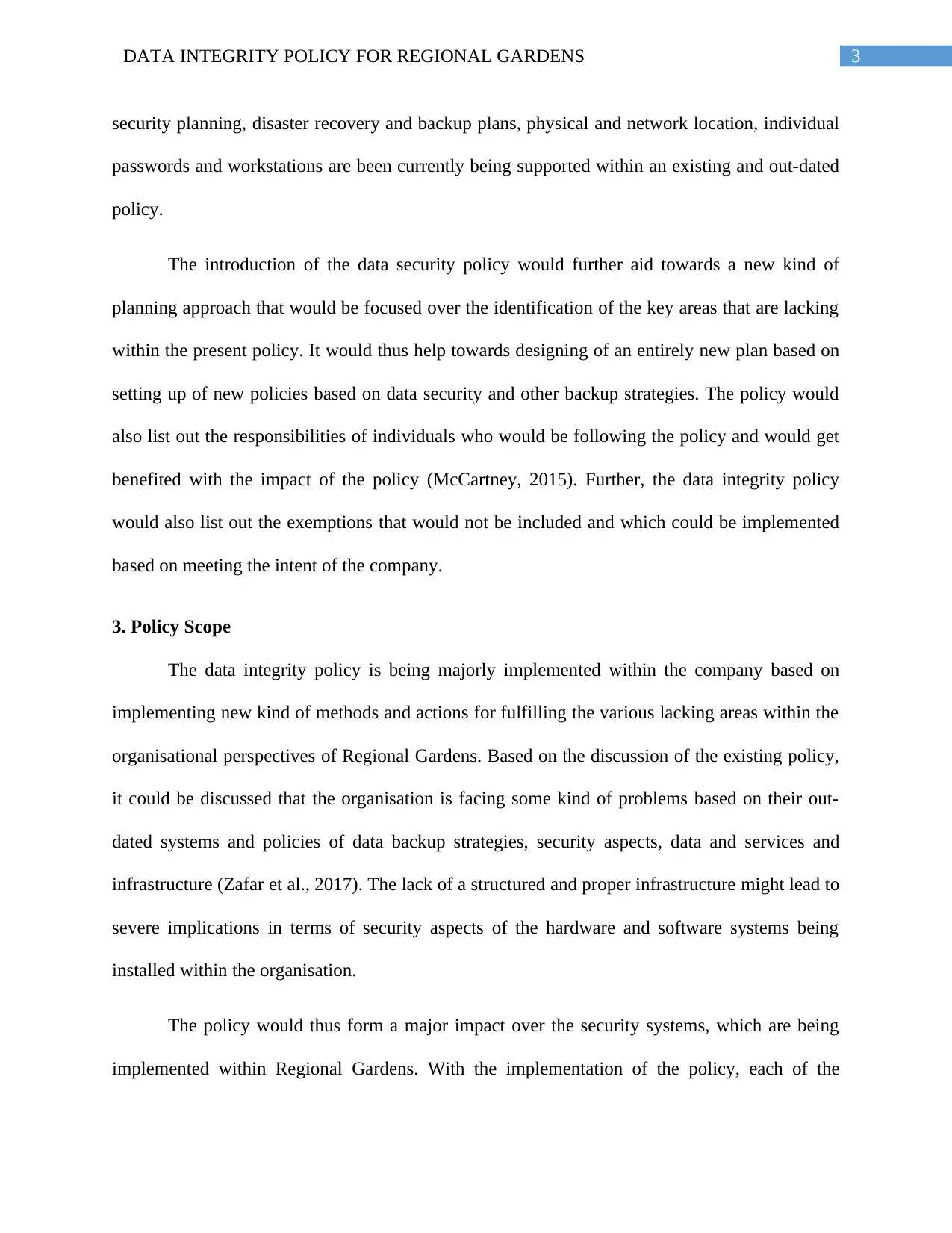
3DATA INTEGRITY POLICY FOR REGIONAL GARDENS
security planning, disaster recovery and backup plans, physical and network location, individual
passwords and workstations are been currently being supported within an existing and out-dated
policy.
The introduction of the data security policy would further aid towards a new kind of
planning approach that would be focused over the identification of the key areas that are lacking
within the present policy. It would thus help towards designing of an entirely new plan based on
setting up of new policies based on data security and other backup strategies. The policy would
also list out the responsibilities of individuals who would be following the policy and would get
benefited with the impact of the policy (McCartney, 2015). Further, the data integrity policy
would also list out the exemptions that would not be included and which could be implemented
based on meeting the intent of the company.
3. Policy Scope
The data integrity policy is being majorly implemented within the company based on
implementing new kind of methods and actions for fulfilling the various lacking areas within the
organisational perspectives of Regional Gardens. Based on the discussion of the existing policy,
it could be discussed that the organisation is facing some kind of problems based on their out-
dated systems and policies of data backup strategies, security aspects, data and services and
infrastructure (Zafar et al., 2017). The lack of a structured and proper infrastructure might lead to
severe implications in terms of security aspects of the hardware and software systems being
installed within the organisation.
The policy would thus form a major impact over the security systems, which are being
implemented within Regional Gardens. With the implementation of the policy, each of the
security planning, disaster recovery and backup plans, physical and network location, individual
passwords and workstations are been currently being supported within an existing and out-dated
policy.
The introduction of the data security policy would further aid towards a new kind of
planning approach that would be focused over the identification of the key areas that are lacking
within the present policy. It would thus help towards designing of an entirely new plan based on
setting up of new policies based on data security and other backup strategies. The policy would
also list out the responsibilities of individuals who would be following the policy and would get
benefited with the impact of the policy (McCartney, 2015). Further, the data integrity policy
would also list out the exemptions that would not be included and which could be implemented
based on meeting the intent of the company.
3. Policy Scope
The data integrity policy is being majorly implemented within the company based on
implementing new kind of methods and actions for fulfilling the various lacking areas within the
organisational perspectives of Regional Gardens. Based on the discussion of the existing policy,
it could be discussed that the organisation is facing some kind of problems based on their out-
dated systems and policies of data backup strategies, security aspects, data and services and
infrastructure (Zafar et al., 2017). The lack of a structured and proper infrastructure might lead to
severe implications in terms of security aspects of the hardware and software systems being
installed within the organisation.
The policy would thus form a major impact over the security systems, which are being
implemented within Regional Gardens. With the implementation of the policy, each of the
Paraphrase This Document
Need a fresh take? Get an instant paraphrase of this document with our AI Paraphraser
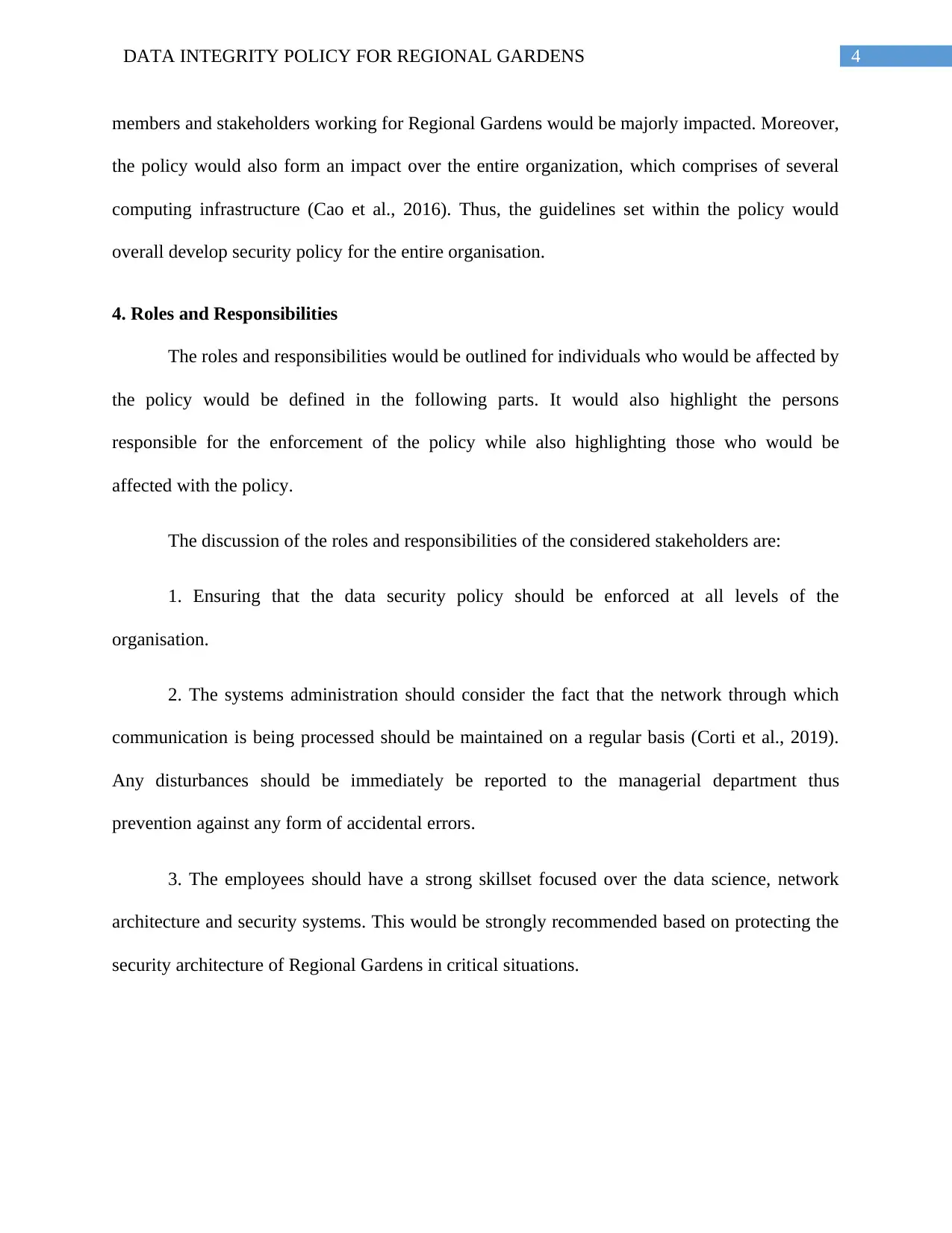
4DATA INTEGRITY POLICY FOR REGIONAL GARDENS
members and stakeholders working for Regional Gardens would be majorly impacted. Moreover,
the policy would also form an impact over the entire organization, which comprises of several
computing infrastructure (Cao et al., 2016). Thus, the guidelines set within the policy would
overall develop security policy for the entire organisation.
4. Roles and Responsibilities
The roles and responsibilities would be outlined for individuals who would be affected by
the policy would be defined in the following parts. It would also highlight the persons
responsible for the enforcement of the policy while also highlighting those who would be
affected with the policy.
The discussion of the roles and responsibilities of the considered stakeholders are:
1. Ensuring that the data security policy should be enforced at all levels of the
organisation.
2. The systems administration should consider the fact that the network through which
communication is being processed should be maintained on a regular basis (Corti et al., 2019).
Any disturbances should be immediately be reported to the managerial department thus
prevention against any form of accidental errors.
3. The employees should have a strong skillset focused over the data science, network
architecture and security systems. This would be strongly recommended based on protecting the
security architecture of Regional Gardens in critical situations.
members and stakeholders working for Regional Gardens would be majorly impacted. Moreover,
the policy would also form an impact over the entire organization, which comprises of several
computing infrastructure (Cao et al., 2016). Thus, the guidelines set within the policy would
overall develop security policy for the entire organisation.
4. Roles and Responsibilities
The roles and responsibilities would be outlined for individuals who would be affected by
the policy would be defined in the following parts. It would also highlight the persons
responsible for the enforcement of the policy while also highlighting those who would be
affected with the policy.
The discussion of the roles and responsibilities of the considered stakeholders are:
1. Ensuring that the data security policy should be enforced at all levels of the
organisation.
2. The systems administration should consider the fact that the network through which
communication is being processed should be maintained on a regular basis (Corti et al., 2019).
Any disturbances should be immediately be reported to the managerial department thus
prevention against any form of accidental errors.
3. The employees should have a strong skillset focused over the data science, network
architecture and security systems. This would be strongly recommended based on protecting the
security architecture of Regional Gardens in critical situations.
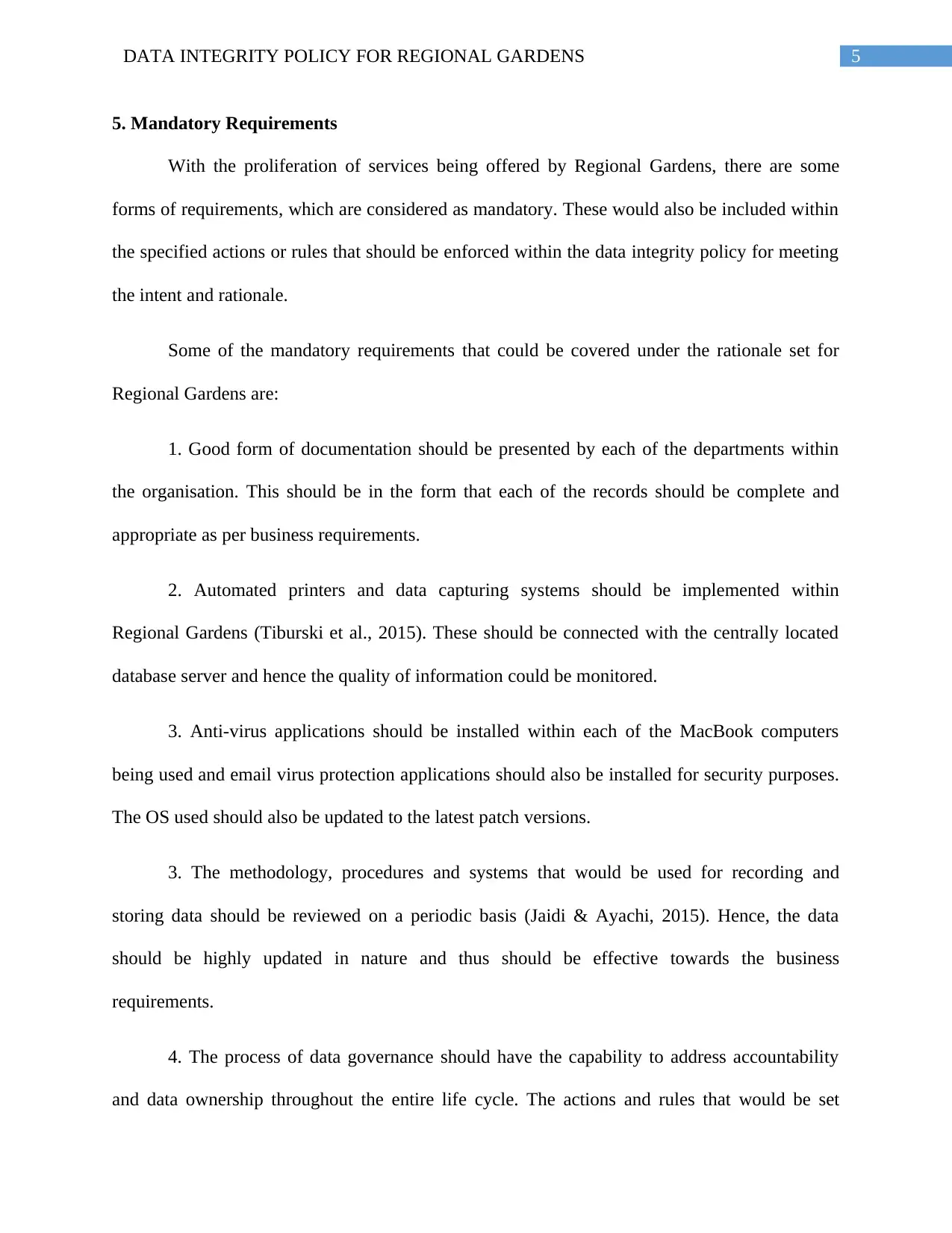
5DATA INTEGRITY POLICY FOR REGIONAL GARDENS
5. Mandatory Requirements
With the proliferation of services being offered by Regional Gardens, there are some
forms of requirements, which are considered as mandatory. These would also be included within
the specified actions or rules that should be enforced within the data integrity policy for meeting
the intent and rationale.
Some of the mandatory requirements that could be covered under the rationale set for
Regional Gardens are:
1. Good form of documentation should be presented by each of the departments within
the organisation. This should be in the form that each of the records should be complete and
appropriate as per business requirements.
2. Automated printers and data capturing systems should be implemented within
Regional Gardens (Tiburski et al., 2015). These should be connected with the centrally located
database server and hence the quality of information could be monitored.
3. Anti-virus applications should be installed within each of the MacBook computers
being used and email virus protection applications should also be installed for security purposes.
The OS used should also be updated to the latest patch versions.
3. The methodology, procedures and systems that would be used for recording and
storing data should be reviewed on a periodic basis (Jaidi & Ayachi, 2015). Hence, the data
should be highly updated in nature and thus should be effective towards the business
requirements.
4. The process of data governance should have the capability to address accountability
and data ownership throughout the entire life cycle. The actions and rules that would be set
5. Mandatory Requirements
With the proliferation of services being offered by Regional Gardens, there are some
forms of requirements, which are considered as mandatory. These would also be included within
the specified actions or rules that should be enforced within the data integrity policy for meeting
the intent and rationale.
Some of the mandatory requirements that could be covered under the rationale set for
Regional Gardens are:
1. Good form of documentation should be presented by each of the departments within
the organisation. This should be in the form that each of the records should be complete and
appropriate as per business requirements.
2. Automated printers and data capturing systems should be implemented within
Regional Gardens (Tiburski et al., 2015). These should be connected with the centrally located
database server and hence the quality of information could be monitored.
3. Anti-virus applications should be installed within each of the MacBook computers
being used and email virus protection applications should also be installed for security purposes.
The OS used should also be updated to the latest patch versions.
3. The methodology, procedures and systems that would be used for recording and
storing data should be reviewed on a periodic basis (Jaidi & Ayachi, 2015). Hence, the data
should be highly updated in nature and thus should be effective towards the business
requirements.
4. The process of data governance should have the capability to address accountability
and data ownership throughout the entire life cycle. The actions and rules that would be set
⊘ This is a preview!⊘
Do you want full access?
Subscribe today to unlock all pages.

Trusted by 1+ million students worldwide
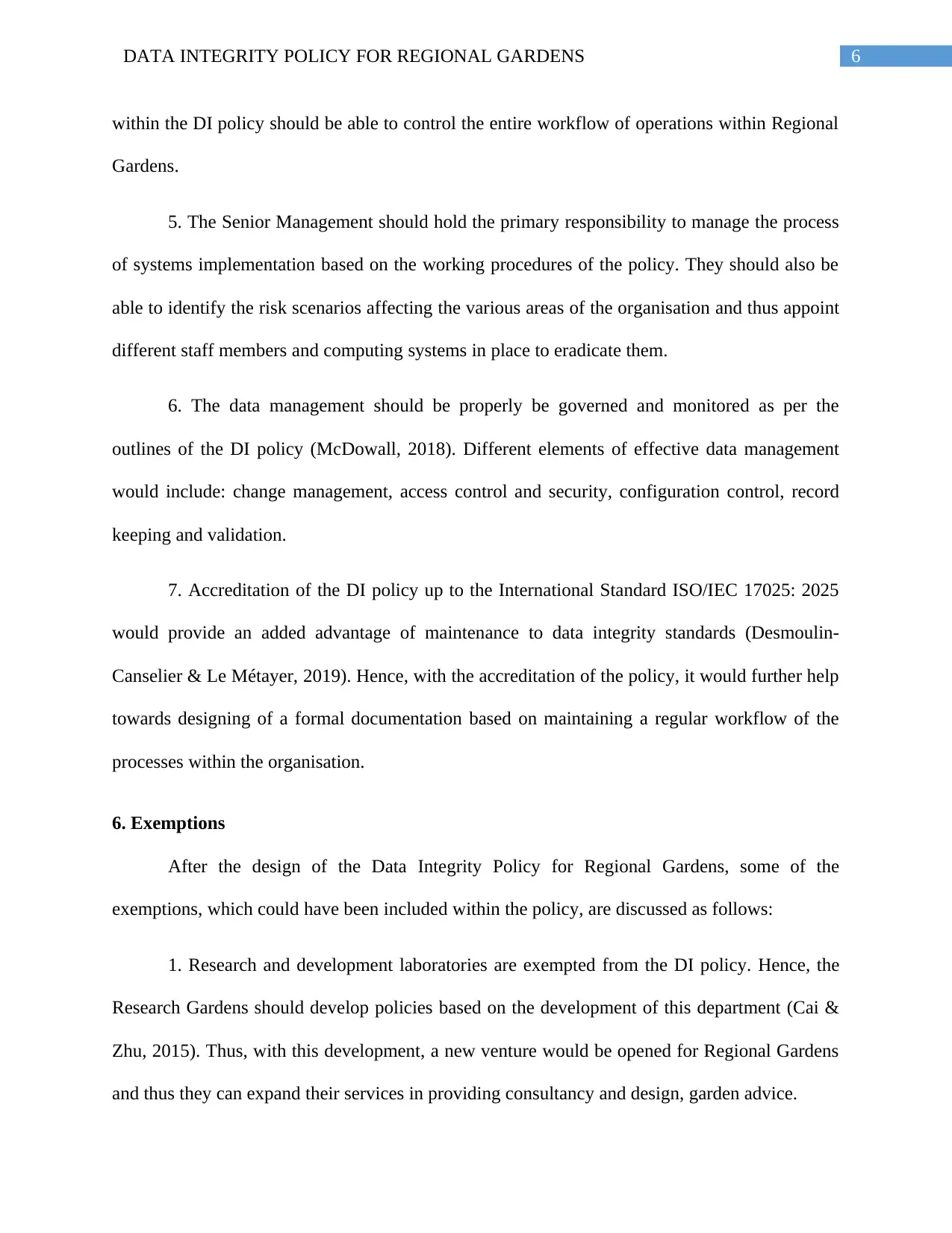
6DATA INTEGRITY POLICY FOR REGIONAL GARDENS
within the DI policy should be able to control the entire workflow of operations within Regional
Gardens.
5. The Senior Management should hold the primary responsibility to manage the process
of systems implementation based on the working procedures of the policy. They should also be
able to identify the risk scenarios affecting the various areas of the organisation and thus appoint
different staff members and computing systems in place to eradicate them.
6. The data management should be properly be governed and monitored as per the
outlines of the DI policy (McDowall, 2018). Different elements of effective data management
would include: change management, access control and security, configuration control, record
keeping and validation.
7. Accreditation of the DI policy up to the International Standard ISO/IEC 17025: 2025
would provide an added advantage of maintenance to data integrity standards (Desmoulin-
Canselier & Le Métayer, 2019). Hence, with the accreditation of the policy, it would further help
towards designing of a formal documentation based on maintaining a regular workflow of the
processes within the organisation.
6. Exemptions
After the design of the Data Integrity Policy for Regional Gardens, some of the
exemptions, which could have been included within the policy, are discussed as follows:
1. Research and development laboratories are exempted from the DI policy. Hence, the
Research Gardens should develop policies based on the development of this department (Cai &
Zhu, 2015). Thus, with this development, a new venture would be opened for Regional Gardens
and thus they can expand their services in providing consultancy and design, garden advice.
within the DI policy should be able to control the entire workflow of operations within Regional
Gardens.
5. The Senior Management should hold the primary responsibility to manage the process
of systems implementation based on the working procedures of the policy. They should also be
able to identify the risk scenarios affecting the various areas of the organisation and thus appoint
different staff members and computing systems in place to eradicate them.
6. The data management should be properly be governed and monitored as per the
outlines of the DI policy (McDowall, 2018). Different elements of effective data management
would include: change management, access control and security, configuration control, record
keeping and validation.
7. Accreditation of the DI policy up to the International Standard ISO/IEC 17025: 2025
would provide an added advantage of maintenance to data integrity standards (Desmoulin-
Canselier & Le Métayer, 2019). Hence, with the accreditation of the policy, it would further help
towards designing of a formal documentation based on maintaining a regular workflow of the
processes within the organisation.
6. Exemptions
After the design of the Data Integrity Policy for Regional Gardens, some of the
exemptions, which could have been included within the policy, are discussed as follows:
1. Research and development laboratories are exempted from the DI policy. Hence, the
Research Gardens should develop policies based on the development of this department (Cai &
Zhu, 2015). Thus, with this development, a new venture would be opened for Regional Gardens
and thus they can expand their services in providing consultancy and design, garden advice.
Paraphrase This Document
Need a fresh take? Get an instant paraphrase of this document with our AI Paraphraser
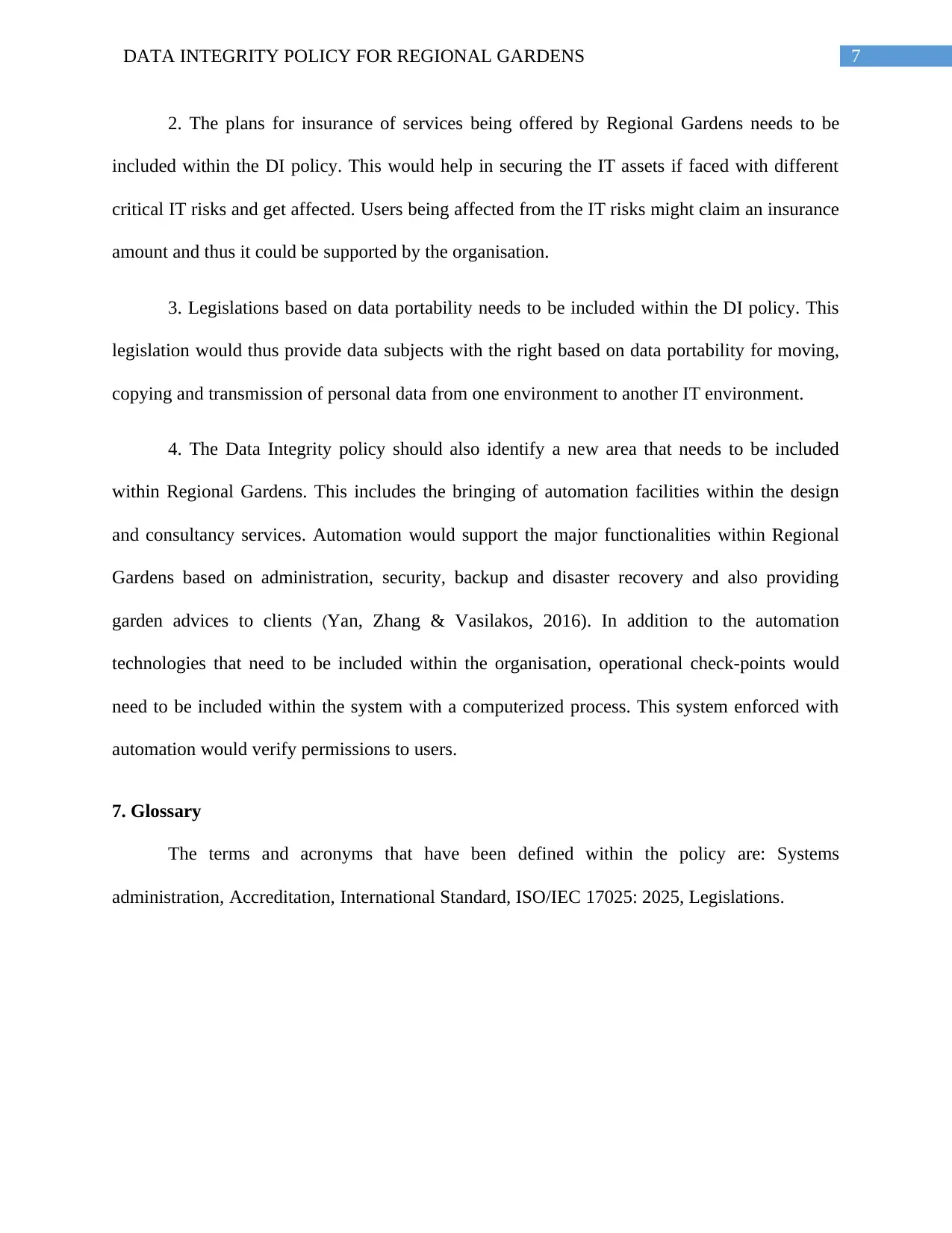
7DATA INTEGRITY POLICY FOR REGIONAL GARDENS
2. The plans for insurance of services being offered by Regional Gardens needs to be
included within the DI policy. This would help in securing the IT assets if faced with different
critical IT risks and get affected. Users being affected from the IT risks might claim an insurance
amount and thus it could be supported by the organisation.
3. Legislations based on data portability needs to be included within the DI policy. This
legislation would thus provide data subjects with the right based on data portability for moving,
copying and transmission of personal data from one environment to another IT environment.
4. The Data Integrity policy should also identify a new area that needs to be included
within Regional Gardens. This includes the bringing of automation facilities within the design
and consultancy services. Automation would support the major functionalities within Regional
Gardens based on administration, security, backup and disaster recovery and also providing
garden advices to clients (Yan, Zhang & Vasilakos, 2016). In addition to the automation
technologies that need to be included within the organisation, operational check-points would
need to be included within the system with a computerized process. This system enforced with
automation would verify permissions to users.
7. Glossary
The terms and acronyms that have been defined within the policy are: Systems
administration, Accreditation, International Standard, ISO/IEC 17025: 2025, Legislations.
2. The plans for insurance of services being offered by Regional Gardens needs to be
included within the DI policy. This would help in securing the IT assets if faced with different
critical IT risks and get affected. Users being affected from the IT risks might claim an insurance
amount and thus it could be supported by the organisation.
3. Legislations based on data portability needs to be included within the DI policy. This
legislation would thus provide data subjects with the right based on data portability for moving,
copying and transmission of personal data from one environment to another IT environment.
4. The Data Integrity policy should also identify a new area that needs to be included
within Regional Gardens. This includes the bringing of automation facilities within the design
and consultancy services. Automation would support the major functionalities within Regional
Gardens based on administration, security, backup and disaster recovery and also providing
garden advices to clients (Yan, Zhang & Vasilakos, 2016). In addition to the automation
technologies that need to be included within the organisation, operational check-points would
need to be included within the system with a computerized process. This system enforced with
automation would verify permissions to users.
7. Glossary
The terms and acronyms that have been defined within the policy are: Systems
administration, Accreditation, International Standard, ISO/IEC 17025: 2025, Legislations.
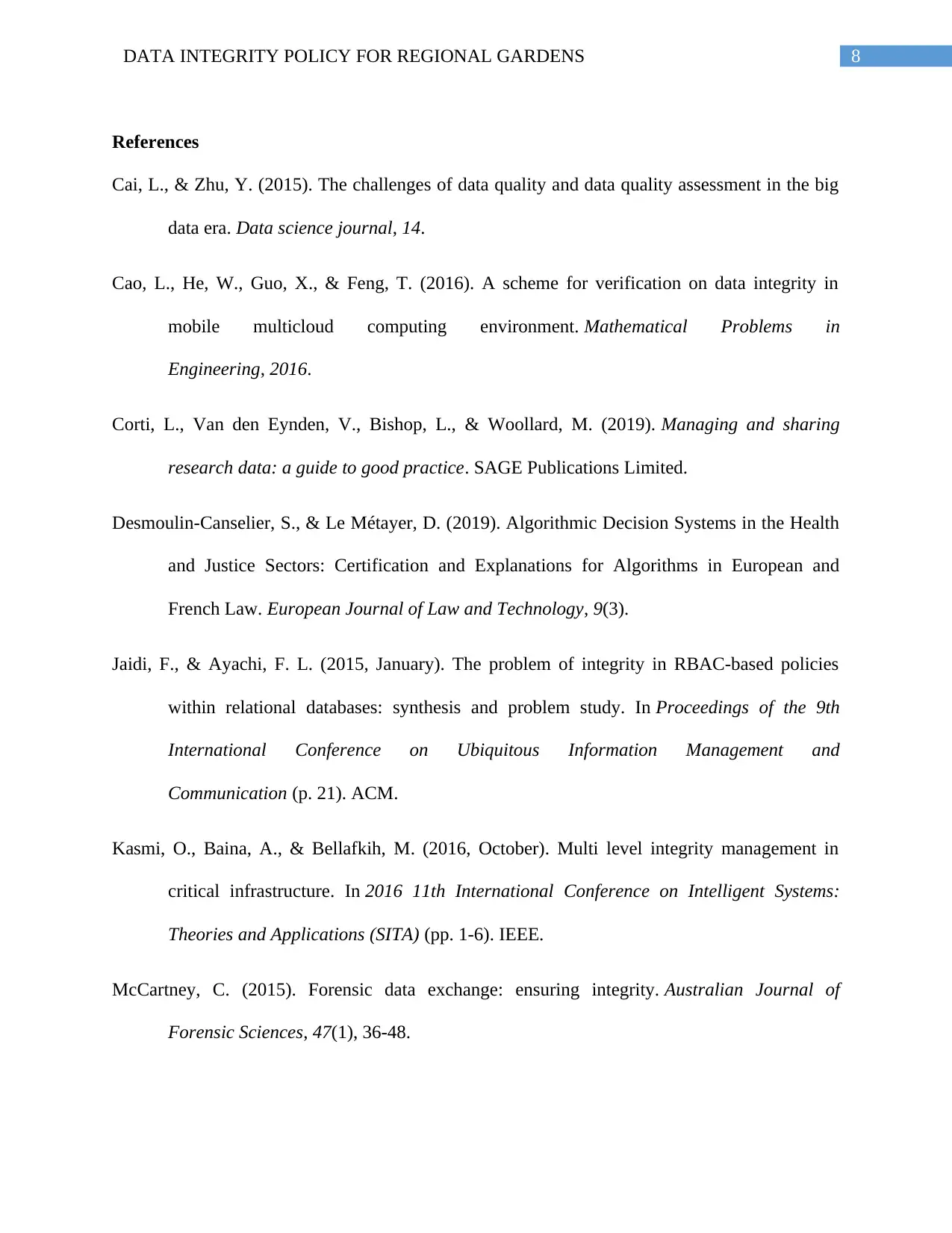
8DATA INTEGRITY POLICY FOR REGIONAL GARDENS
References
Cai, L., & Zhu, Y. (2015). The challenges of data quality and data quality assessment in the big
data era. Data science journal, 14.
Cao, L., He, W., Guo, X., & Feng, T. (2016). A scheme for verification on data integrity in
mobile multicloud computing environment. Mathematical Problems in
Engineering, 2016.
Corti, L., Van den Eynden, V., Bishop, L., & Woollard, M. (2019). Managing and sharing
research data: a guide to good practice. SAGE Publications Limited.
Desmoulin-Canselier, S., & Le Métayer, D. (2019). Algorithmic Decision Systems in the Health
and Justice Sectors: Certification and Explanations for Algorithms in European and
French Law. European Journal of Law and Technology, 9(3).
Jaidi, F., & Ayachi, F. L. (2015, January). The problem of integrity in RBAC-based policies
within relational databases: synthesis and problem study. In Proceedings of the 9th
International Conference on Ubiquitous Information Management and
Communication (p. 21). ACM.
Kasmi, O., Baina, A., & Bellafkih, M. (2016, October). Multi level integrity management in
critical infrastructure. In 2016 11th International Conference on Intelligent Systems:
Theories and Applications (SITA) (pp. 1-6). IEEE.
McCartney, C. (2015). Forensic data exchange: ensuring integrity. Australian Journal of
Forensic Sciences, 47(1), 36-48.
References
Cai, L., & Zhu, Y. (2015). The challenges of data quality and data quality assessment in the big
data era. Data science journal, 14.
Cao, L., He, W., Guo, X., & Feng, T. (2016). A scheme for verification on data integrity in
mobile multicloud computing environment. Mathematical Problems in
Engineering, 2016.
Corti, L., Van den Eynden, V., Bishop, L., & Woollard, M. (2019). Managing and sharing
research data: a guide to good practice. SAGE Publications Limited.
Desmoulin-Canselier, S., & Le Métayer, D. (2019). Algorithmic Decision Systems in the Health
and Justice Sectors: Certification and Explanations for Algorithms in European and
French Law. European Journal of Law and Technology, 9(3).
Jaidi, F., & Ayachi, F. L. (2015, January). The problem of integrity in RBAC-based policies
within relational databases: synthesis and problem study. In Proceedings of the 9th
International Conference on Ubiquitous Information Management and
Communication (p. 21). ACM.
Kasmi, O., Baina, A., & Bellafkih, M. (2016, October). Multi level integrity management in
critical infrastructure. In 2016 11th International Conference on Intelligent Systems:
Theories and Applications (SITA) (pp. 1-6). IEEE.
McCartney, C. (2015). Forensic data exchange: ensuring integrity. Australian Journal of
Forensic Sciences, 47(1), 36-48.
⊘ This is a preview!⊘
Do you want full access?
Subscribe today to unlock all pages.

Trusted by 1+ million students worldwide
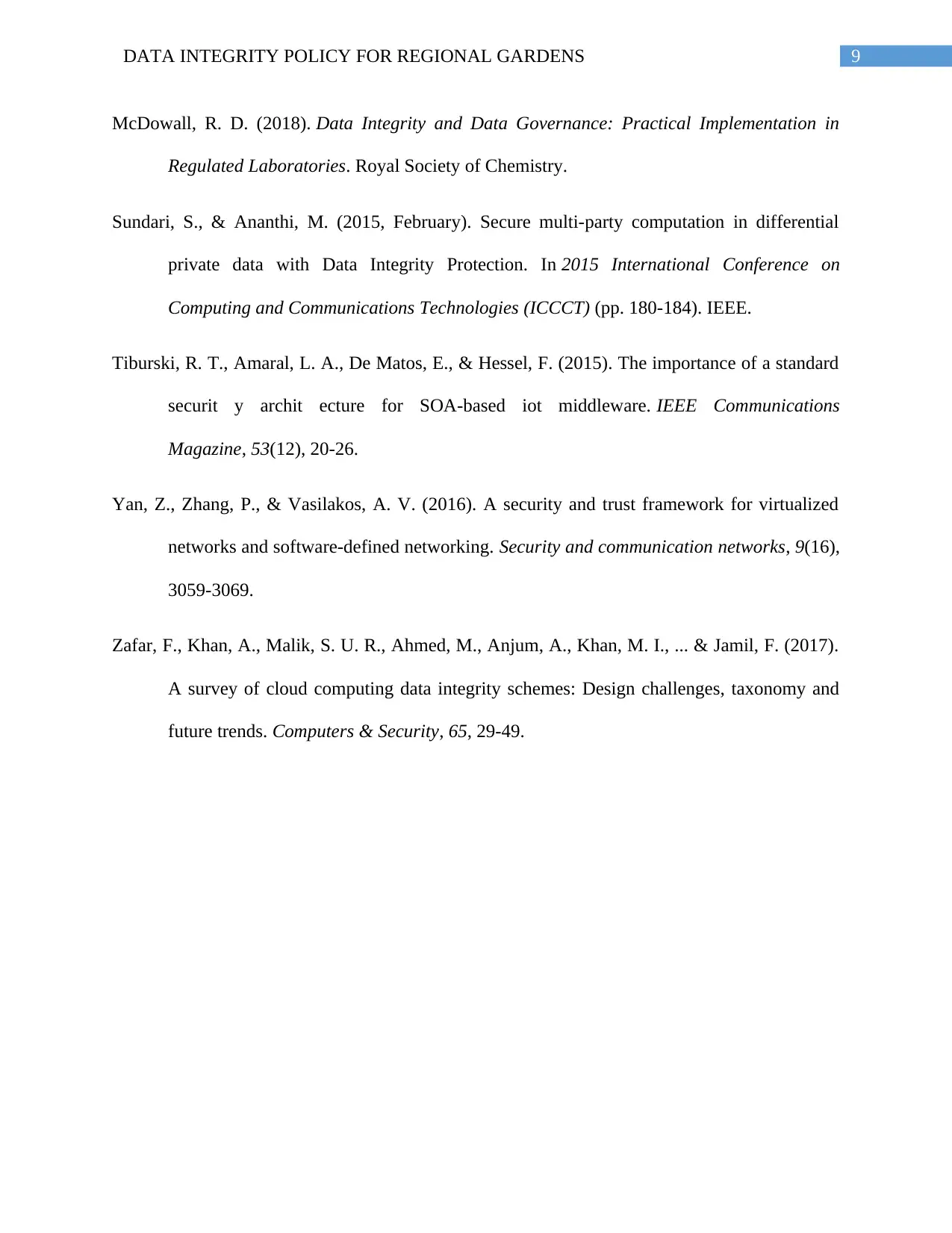
9DATA INTEGRITY POLICY FOR REGIONAL GARDENS
McDowall, R. D. (2018). Data Integrity and Data Governance: Practical Implementation in
Regulated Laboratories. Royal Society of Chemistry.
Sundari, S., & Ananthi, M. (2015, February). Secure multi-party computation in differential
private data with Data Integrity Protection. In 2015 International Conference on
Computing and Communications Technologies (ICCCT) (pp. 180-184). IEEE.
Tiburski, R. T., Amaral, L. A., De Matos, E., & Hessel, F. (2015). The importance of a standard
securit y archit ecture for SOA-based iot middleware. IEEE Communications
Magazine, 53(12), 20-26.
Yan, Z., Zhang, P., & Vasilakos, A. V. (2016). A security and trust framework for virtualized
networks and software‐defined networking. Security and communication networks, 9(16),
3059-3069.
Zafar, F., Khan, A., Malik, S. U. R., Ahmed, M., Anjum, A., Khan, M. I., ... & Jamil, F. (2017).
A survey of cloud computing data integrity schemes: Design challenges, taxonomy and
future trends. Computers & Security, 65, 29-49.
McDowall, R. D. (2018). Data Integrity and Data Governance: Practical Implementation in
Regulated Laboratories. Royal Society of Chemistry.
Sundari, S., & Ananthi, M. (2015, February). Secure multi-party computation in differential
private data with Data Integrity Protection. In 2015 International Conference on
Computing and Communications Technologies (ICCCT) (pp. 180-184). IEEE.
Tiburski, R. T., Amaral, L. A., De Matos, E., & Hessel, F. (2015). The importance of a standard
securit y archit ecture for SOA-based iot middleware. IEEE Communications
Magazine, 53(12), 20-26.
Yan, Z., Zhang, P., & Vasilakos, A. V. (2016). A security and trust framework for virtualized
networks and software‐defined networking. Security and communication networks, 9(16),
3059-3069.
Zafar, F., Khan, A., Malik, S. U. R., Ahmed, M., Anjum, A., Khan, M. I., ... & Jamil, F. (2017).
A survey of cloud computing data integrity schemes: Design challenges, taxonomy and
future trends. Computers & Security, 65, 29-49.
1 out of 10
Related Documents
Your All-in-One AI-Powered Toolkit for Academic Success.
+13062052269
info@desklib.com
Available 24*7 on WhatsApp / Email
![[object Object]](/_next/static/media/star-bottom.7253800d.svg)
Unlock your academic potential
Copyright © 2020–2026 A2Z Services. All Rights Reserved. Developed and managed by ZUCOL.





